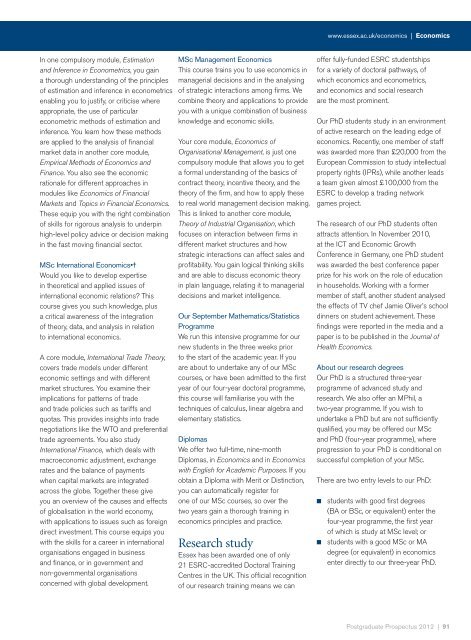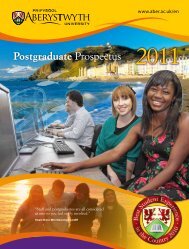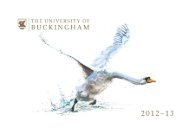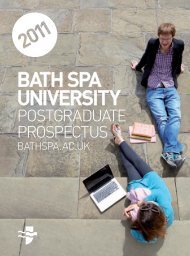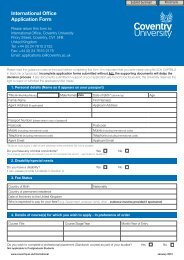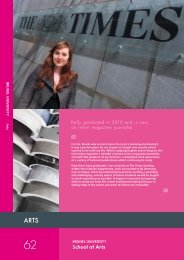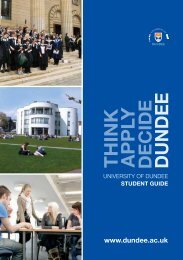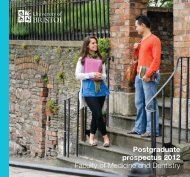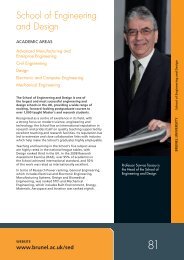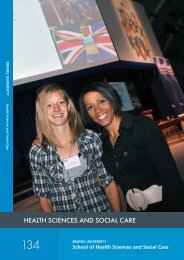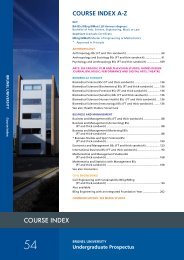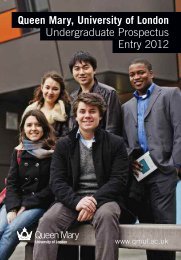Postgraduate Prospectus
Postgraduate Prospectus
Postgraduate Prospectus
Create successful ePaper yourself
Turn your PDF publications into a flip-book with our unique Google optimized e-Paper software.
www.essex.ac.uk/economics | Economics<br />
In one compulsory module, Estimation<br />
and Inference in Econometrics, you gain<br />
a thorough understanding of the principles<br />
of estimation and inference in econometrics<br />
enabling you to justify, or criticise where<br />
appropriate, the use of particular<br />
econometric methods of estimation and<br />
inference. You learn how these methods<br />
are applied to the analysis of financial<br />
market data in another core module,<br />
Empirical Methods of Economics and<br />
Finance. You also see the economic<br />
rationale for different approaches in<br />
modules like Economics of Financial<br />
Markets and Topics in Financial Economics.<br />
These equip you with the right combination<br />
of skills for rigorous analysis to underpin<br />
high-level policy advice or decision making<br />
in the fast moving financial sector.<br />
MSc International Economics•†<br />
Would you like to develop expertise<br />
in theoretical and applied issues of<br />
international economic relations? This<br />
course gives you such knowledge, plus<br />
a critical awareness of the integration<br />
of theory, data, and analysis in relation<br />
to international economics.<br />
A core module, International Trade Theory,<br />
covers trade models under different<br />
economic settings and with different<br />
market structures. You examine their<br />
implications for patterns of trade<br />
and trade policies such as tariffs and<br />
quotas. This provides insights into trade<br />
negotiations like the WTO and preferential<br />
trade agreements. You also study<br />
International Finance, which deals with<br />
macroeconomic adjustment, exchange<br />
rates and the balance of payments<br />
when capital markets are integrated<br />
across the globe. Together these give<br />
you an overview of the causes and effects<br />
of globalisation in the world economy,<br />
with applications to issues such as foreign<br />
direct investment. This course equips you<br />
with the skills for a career in international<br />
organisations engaged in business<br />
and finance, or in government and<br />
non-governmental organisations<br />
concerned with global development.<br />
MSc Management Economics<br />
This course trains you to use economics in<br />
managerial decisions and in the analysing<br />
of strategic interactions among firms. We<br />
combine theory and applications to provide<br />
you with a unique combination of business<br />
knowledge and economic skills.<br />
Your core module, Economics of<br />
Organisational Management, is just one<br />
compulsory module that allows you to get<br />
a formal understanding of the basics of<br />
contract theory, incentive theory, and the<br />
theory of the firm, and how to apply these<br />
to real world management decision making.<br />
This is linked to another core module,<br />
Theory of Industrial Organisation, which<br />
focuses on interaction between firms in<br />
different market structures and how<br />
strategic interactions can affect sales and<br />
profitability. You gain logical thinking skills<br />
and are able to discuss economic theory<br />
in plain language, relating it to managerial<br />
decisions and market intelligence.<br />
Our September Mathematics/Statistics<br />
Programme<br />
We run this intensive programme for our<br />
new students in the three weeks prior<br />
to the start of the academic year. If you<br />
are about to undertake any of our MSc<br />
courses, or have been admitted to the first<br />
year of our four-year doctoral programme,<br />
this course will familiarise you with the<br />
techniques of calculus, linear algebra and<br />
elementary statistics.<br />
Diplomas<br />
We offer two full-time, nine-month<br />
Diplomas, in Economics and in Economics<br />
with English for Academic Purposes. If you<br />
obtain a Diploma with Merit or Distinction,<br />
you can automatically register for<br />
one of our MSc courses, so over the<br />
two years gain a thorough training in<br />
economics principles and practice.<br />
Research study<br />
Essex has been awarded one of only<br />
21 ESRC-accredited Doctoral Training<br />
Centres in the UK. This official recognition<br />
of our research training means we can<br />
offer fully-funded ESRC studentships<br />
for a variety of doctoral pathways, of<br />
which economics and econometrics,<br />
and economics and social research<br />
are the most prominent.<br />
Our PhD students study in an environment<br />
of active research on the leading edge of<br />
economics. Recently, one member of staff<br />
was awarded more than £20,000 from the<br />
European Commission to study intellectual<br />
property rights (IPRs), while another leads<br />
a team given almost £100,000 from the<br />
ESRC to develop a trading network<br />
games project.<br />
The research of our PhD students often<br />
attracts attention. In November 2010,<br />
at the ICT and Economic Growth<br />
Conference in Germany, one PhD student<br />
was awarded the best conference paper<br />
prize for his work on the role of education<br />
in households. Working with a former<br />
member of staff, another student analysed<br />
the effects of TV chef Jamie Oliver’s school<br />
dinners on student achievement. These<br />
findings were reported in the media and a<br />
paper is to be published in the Journal of<br />
Health Economics.<br />
About our research degrees<br />
Our PhD is a structured three-year<br />
programme of advanced study and<br />
research. We also offer an MPhil, a<br />
two-year programme. If you wish to<br />
undertake a PhD but are not sufficiently<br />
qualified, you may be offered our MSc<br />
and PhD (four-year programme), where<br />
progression to your PhD is conditional on<br />
successful completion of your MSc.<br />
There are two entry levels to our PhD:<br />
n<br />
n<br />
students with good first degrees<br />
(BA or BSc, or equivalent) enter the<br />
four-year programme, the first year<br />
of which is study at MSc level; or<br />
students with a good MSc or MA<br />
degree (or equivalent) in economics<br />
enter directly to our three-year PhD.<br />
<strong>Postgraduate</strong> <strong>Prospectus</strong> 2012 | 91


